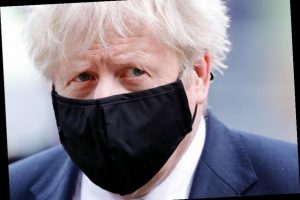When can we stop wearing face masks?

WEARING a face covering has become almost second nature to Brits, with coronavirus measures dictating we wear them on public transport, in shops, cafes and pubs.
But under Boris Johnson's newly-revealed roadmap out of lockdown, face masks could be scrapped by June.
?? Read our UK lockdown live blog for the latest news & updates on Boris' roadmap…
But, when will Brits no longer have to mask up when they are out and about, and what are the factors that will determine when this happens?
Here's all you need to know.
When will we stop wearing face coverings?
Wearing a face covering is currently mandatory on public transport and in indoor settings such as shops.
The Government said it will complete a review into measures including face masks and the 1m-plus rule before June 21 – when all other restrictions are lifted.
Boris Johnson laid out his four step plan to ease lockdown in a 68-page document on Monday and expressed hope that life could return to normal by the summer.
In the roadmap, the Government says: "Social distancing is difficult and damaging for businesses and, as a result, it is important to return to as near to normal as quickly as possible.
"Ahead of Step 4, as more is understood about the impact of vaccines on transmission and a far greater proportion of the population has been vaccinated, the Government will complete a review of social distancing measures and other long-term measures that have been put in place to limit transmission.
"The results of the review will help inform decisions on the timing and circumstances under which rules on 1m+, face masks and other measures may be lifted."
Why do we need to wear face coverings?
Covid-19 spreads through droplets that are released when a person coughs or sneezes.
Face coverings should be worn to protect other people from coronavirus rather than yourself.
Masks should cover your nose and mouth – the two main sources of transmission.
The European Centre for Disease Prevention and Control (ECDC) says that the use of face masks in public places may reduce the spread of infection in the community when they are worn by people who might not realise they are infected with the virus.
When should I wear a face covering?
It has been compulsory to wear a face covering on public transport in the UK since June 15.
Their use is also mandatory in train stations, airports, ports, and bus and coach stations.
Wearing a face mask in shops became compulsory on July 24.
Face coverings are also compulsory in England and Scotland in venues such as banks, places of worship, and libraries.
They must also be worn when visiting attractions such as museums, galleries, aquariums and theme parks.
Pupils and teachers in all secondary schools in England have been required to wear a face mask in communal areas and corridors since the country entered a second national lockdown on November 5.
You should wear a face mask when it's difficult to social distance and where you come into contact with people you don't normally meet.
What are the fines if you don't wear face coverings?
The police can take measures if the public do not comply without a valid exemption.
Children under the age of 11 and people with breathing problems, mental illness, and/or physical disabilities are exempt from wearing a mask.
Transport operators can refuse access to services if a passenger is not wearing a mask.
Cops and Transport for London can issue fines of £200 (reduced to £100 if paid within 14 days) for the first offence.
Repeat offenders will have their fines doubled at each offence – up to a maximum punishment of £6,400.
Matt Hancock says he hopes Brits will be able to hug their mates by May 17
Source: Read Full Article




